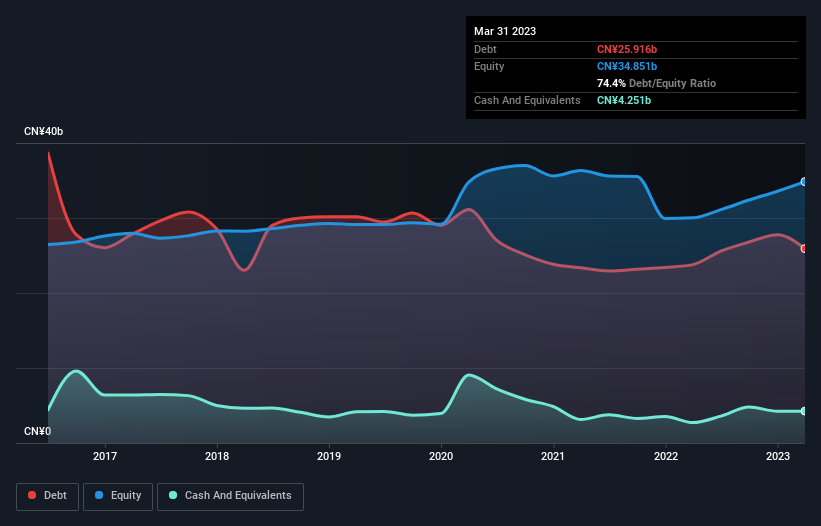- Hong Kong
- /
- Oil and Gas
- /
- SEHK:1138
We Think COSCO SHIPPING Energy Transportation (HKG:1138) Is Taking Some Risk With Its Debt

The external fund manager backed by Berkshire Hathaway's Charlie Munger, Li Lu, makes no bones about it when he says 'The biggest investment risk is not the volatility of prices, but whether you will suffer a permanent loss of capital.' When we think about how risky a company is, we always like to look at its use of debt, since debt overload can lead to ruin. We note that COSCO SHIPPING Energy Transportation Co., Ltd. (HKG:1138) does have debt on its balance sheet. But the more important question is: how much risk is that debt creating?
When Is Debt Dangerous?
Debt and other liabilities become risky for a business when it cannot easily fulfill those obligations, either with free cash flow or by raising capital at an attractive price. Part and parcel of capitalism is the process of 'creative destruction' where failed businesses are mercilessly liquidated by their bankers. While that is not too common, we often do see indebted companies permanently diluting shareholders because lenders force them to raise capital at a distressed price. Having said that, the most common situation is where a company manages its debt reasonably well - and to its own advantage. When we think about a company's use of debt, we first look at cash and debt together.
Check out our latest analysis for COSCO SHIPPING Energy Transportation
How Much Debt Does COSCO SHIPPING Energy Transportation Carry?
You can click the graphic below for the historical numbers, but it shows that as of March 2023 COSCO SHIPPING Energy Transportation had CN¥25.9b of debt, an increase on CN¥23.8b, over one year. However, it does have CN¥4.25b in cash offsetting this, leading to net debt of about CN¥21.7b.

A Look At COSCO SHIPPING Energy Transportation's Liabilities
The latest balance sheet data shows that COSCO SHIPPING Energy Transportation had liabilities of CN¥10.4b due within a year, and liabilities of CN¥23.6b falling due after that. Offsetting this, it had CN¥4.25b in cash and CN¥2.66b in receivables that were due within 12 months. So its liabilities outweigh the sum of its cash and (near-term) receivables by CN¥27.1b.
While this might seem like a lot, it is not so bad since COSCO SHIPPING Energy Transportation has a market capitalization of CN¥50.9b, and so it could probably strengthen its balance sheet by raising capital if it needed to. But we definitely want to keep our eyes open to indications that its debt is bringing too much risk.
We measure a company's debt load relative to its earnings power by looking at its net debt divided by its earnings before interest, tax, depreciation, and amortization (EBITDA) and by calculating how easily its earnings before interest and tax (EBIT) cover its interest expense (interest cover). Thus we consider debt relative to earnings both with and without depreciation and amortization expenses.
COSCO SHIPPING Energy Transportation's net debt is 3.4 times its EBITDA, which is a significant but still reasonable amount of leverage. But its EBIT was about 75.0 times its interest expense, implying the company isn't really paying a high cost to maintain that level of debt. Even were the low cost to prove unsustainable, that is a good sign. Notably, COSCO SHIPPING Energy Transportation made a loss at the EBIT level, last year, but improved that to positive EBIT of CN¥3.9b in the last twelve months. When analysing debt levels, the balance sheet is the obvious place to start. But ultimately the future profitability of the business will decide if COSCO SHIPPING Energy Transportation can strengthen its balance sheet over time. So if you want to see what the professionals think, you might find this free report on analyst profit forecasts to be interesting.
Finally, a company can only pay off debt with cold hard cash, not accounting profits. So it is important to check how much of its earnings before interest and tax (EBIT) converts to actual free cash flow. In the last year, COSCO SHIPPING Energy Transportation's free cash flow amounted to 41% of its EBIT, less than we'd expect. That weak cash conversion makes it more difficult to handle indebtedness.
Our View
COSCO SHIPPING Energy Transportation's net debt to EBITDA and level of total liabilities definitely weigh on it, in our esteem. But the good news is it seems to be able to cover its interest expense with its EBIT with ease. Looking at all the angles mentioned above, it does seem to us that COSCO SHIPPING Energy Transportation is a somewhat risky investment as a result of its debt. Not all risk is bad, as it can boost share price returns if it pays off, but this debt risk is worth keeping in mind. The balance sheet is clearly the area to focus on when you are analysing debt. However, not all investment risk resides within the balance sheet - far from it. These risks can be hard to spot. Every company has them, and we've spotted 1 warning sign for COSCO SHIPPING Energy Transportation you should know about.
Of course, if you're the type of investor who prefers buying stocks without the burden of debt, then don't hesitate to discover our exclusive list of net cash growth stocks, today.
New: AI Stock Screener & Alerts
Our new AI Stock Screener scans the market every day to uncover opportunities.
• Dividend Powerhouses (3%+ Yield)
• Undervalued Small Caps with Insider Buying
• High growth Tech and AI Companies
Or build your own from over 50 metrics.
Have feedback on this article? Concerned about the content? Get in touch with us directly. Alternatively, email editorial-team (at) simplywallst.com.
This article by Simply Wall St is general in nature. We provide commentary based on historical data and analyst forecasts only using an unbiased methodology and our articles are not intended to be financial advice. It does not constitute a recommendation to buy or sell any stock, and does not take account of your objectives, or your financial situation. We aim to bring you long-term focused analysis driven by fundamental data. Note that our analysis may not factor in the latest price-sensitive company announcements or qualitative material. Simply Wall St has no position in any stocks mentioned.
About SEHK:1138
COSCO SHIPPING Energy Transportation
An investment holding company, engages in the transportation of oil and liquefied natural gas (LNG) in People’s Republic of China and internationally.
Very undervalued with adequate balance sheet.
Market Insights
Community Narratives



